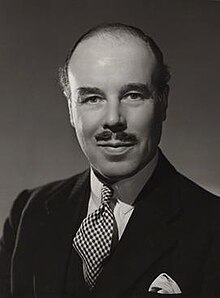Colin Thornton-Kemsley
Sir Colin Thornton-Kemsley | |
|---|---|
 Photograph by Bassano Ltd, taken 1950. | |
| Chairman of the National Liberal Party | |
| In office 1961–1964 | |
| Preceded by | James Henderson-Stewart |
| Succeeded by | David Renton |
| Member of Parliament for North Angus and Mearns (1950-1964) Kincardine and Western Aberdeenshire (1939–1950) | |
| In office 30 March 1939 – 25 September 1964 | |
| Preceded by | Malcolm Barclay-Harvey |
| Succeeded by | Alick Buchanan-Smith |
| Personal details | |
| Born | 2 September 1903 |
| Died | 17 July 1977 (aged 73) |
| Political party | National Liberal Conservative |
Sir Colin Norman Thornton-Kemsley, OBE, TD (2 September 1903 – 17 July 1977) was a Conservative and National Liberal politician in the United Kingdom. He was the Member of Parliament (MP) for Kincardine and Western Aberdeenshire from 1939 to 1950, and for North Angus and Mearns from 1950 until his retirement at the 1964 general election.
Early life
[edit]Thornton-Kemsley was born in 1903 and grew up in a London suburb. He was educated at Chigwell School, and graduated from Wadham College, Oxford.
Whilst he had a Scottish grandfather, he had no real connection to Scotland until 1930, when he married Alice Thornton; his second cousin and the granddaughter of prominent Dundee lawyer, Sir Thomas Thornton, who had purchased Thornton castle in Kincardineshire in 1893, and at the time of the wedding Thornton was the owner and resident of the property.
Political career
[edit]This section needs additional citations for verification. (November 2022) |
Thornton-Kemsley was an active member of the Conservative constituency association for the London suburb of Epping, where he lived. He also served as the Honorary Treasurer of Essex and Middlesex Provincial Area, National Union of Conservative and Unionist Associations.
As a member of the Epping constituency party he made a name for himself in Conservative Party circles as a Neville Chamberlain loyalist who was central to bringing about a censure of Winston Churchill by the Epping Conservative Association.
In 1939 Malcolm Barclay-Harvey, the incumbent Unionist Member of Parliament for Kincardine and Western Aberdeenshire, was offered the position of Governor of South Australia. Thornton-Kemsley, due to his previous role in trying to bringing about a deselection of Churchill by the Epping Conservative Association, was offered the candidacy.
At the outbreak of the Second World War in 1939, Kemsley apologized. Churchill's reply was characteristic: "I certainly think that Englishmen ought to start fair with one another from the outset in so grievous a struggle, and so far as I am concerned the past is dead." (See Thornton-Kemsley, “Winston Secures his Base” in Through Winds and Tides, 1974, pp. 26–36.)
Having joined the Territorial Army (TA) before the war on 31 July 1925, where he was commissioned into the 85th (East Anglian) Field Artillery Brigade of the Royal Artillery, Thornton-Kemsley served during the war.[1] His unit, now the 85th (East Anglian) Field Artillery Regiment, Royal Artillery, was mobilised but went to attend the British Army Staff College at Camberley, from where he graduated and then served as a staff officer with Scottish Command and later Eastern Command.[1]
References
[edit]- ^ a b "British Army officer histories". Unit Histories. 4 January 2022.
External links
[edit]- British Army Officers 1939−1945
- Hansard 1803–2005: contributions in Parliament by Colin Thornton-Kemsley
- 1903 births
- 1977 deaths
- Members of the Parliament of the United Kingdom for Scottish constituencies
- Unionist Party (Scotland) MPs
- UK MPs 1935–1945
- UK MPs 1945–1950
- UK MPs 1950–1951
- UK MPs 1951–1955
- UK MPs 1955–1959
- UK MPs 1959–1964
- Royal Artillery officers
- British Army personnel of World War II
- Alumni of Wadham College, Oxford
- British surveyors
- Knights Bachelor
- Graduates of the Staff College, Camberley
- Officers of the Order of the British Empire
- Scottish Conservative and Unionist MP stubs
- Conservative MP (UK), 1900s birth stubs
